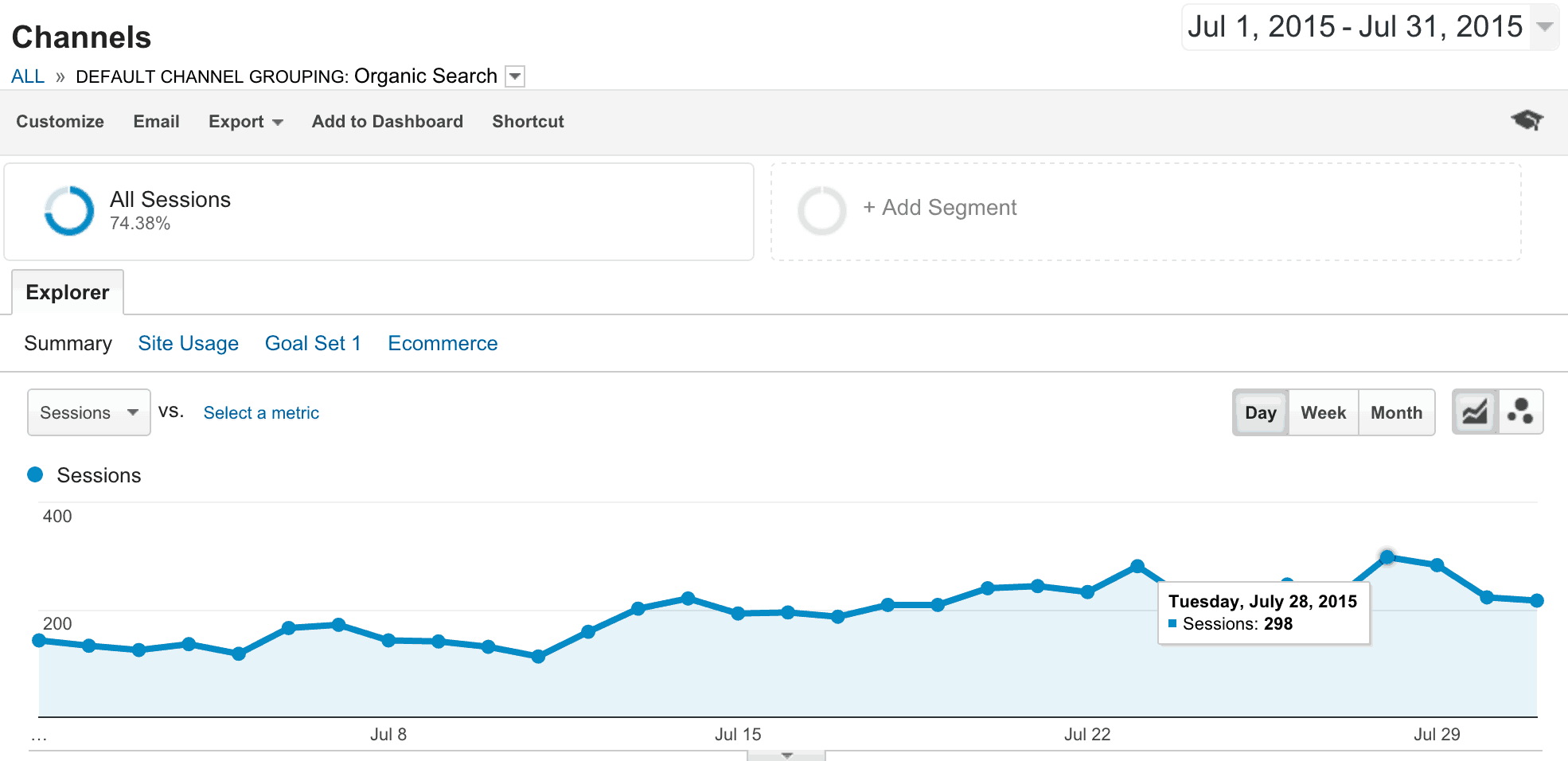The following post is a guest post from a friend of mine, Rufat. It's an interesting one, because it deals with some of the “failure” that we experience as internet marketers. However, there will be some improvements made between now and the next post Rufat has promised to do, so there will be a lot to learn from both posts.
Take it away Rufat…
When you start a blog you of course want to get the most traffic you can imagine and it’s only natural because your success online completely depends on web traffic. Anyone who has a blog understands that before thinking of traffic you need to first think of creating quality content.
Without quality and engaging content you simply can’t get any traffic from search engines. Anyway, lack of traffic is the number 1 reason why most blogs fail to achieve success.
And today I’m going to share with you my experience with my blog (Your Income Advisor). Most of the time bloggers share their success stories which is great because it inspires others.
But sharing bad experience is great too because it can help others avoid mistakes that keep them from achieving success.
My story is about my failure to get the amount of traffic I expected and also I’m going to share with you the info on how I plan to improve this situation and increase my blog traffic.
My mistakes
Mistake #1
I started my blog in November 2014 and by December of the same year I had 100 posts on my blog. And it’s not because I wrote 100 posts within a month. It’s because I wrote them a few months before that.
I was thinking that by the time I started my blog, I want it to be fully complete with lots of helpful information on it. Another reason is because English was my second language and I wanted to first write all my content and then proofread it and then publish.
Anyway, this was my first BIG mistake. Why? Because if I had published my blog posts normally as I created them, then by the time I finished publishing them all, my blog would have gained some authority at least.
Gaining authority and getting content ranked in search engines takes time, probably months which means you should start a blog normally and publish your content as you create it.
So, this was my first mistake. In fact, this means that my blog went online in November 2014 instead of a few months before that.
Mistake #2
My second mistake was that I focused too much on creating posts with highly competitive keyword in mind such as “make money online”.
My intention was to help folks stay away from online scams and point them in the right direction by explaining that success comes through efforts and skills, not through autopilot type of fly-by-night programs.
Intention was good, but results were very poor because “make money online” keyword in any combination is extremely competitive and in fact if you focus on creating this type of content you are going to compete with high traffic and high authority private blogs and sites like Wikihow, Forbes, Entrepreneur etc.
Plus, make money keywords have the lowest conversion rate.
Anyway, this was my second mistake.
Mistake #3
I was taught to choose low competition keywords when creating content because it’s the only way to get good rankings and traffic from search engines.
It’s not a secret that it’s much easier to create many posts with low competition keywords in mind and get them ranked instead of trying to outrank authority sites for a highly competitive keywords. This way you can drive a good amount of traffic to your blog.
I mainly focused on keywords under 300 QSR (quoted search results). This metric shows you real competition for any given term. And I did so. The results are not bad, but not as good as I expected.
At the moment I have 290 pages on my website most of which are product reviews (70%) and the rest of the stuff is SEO, wordpress, make money online posts. I have over 80 pages ranked in top 10 and over 80 pages ranked in top 20.
The rest of my content is ranked in top 30 which is not a big deal because the most traffic comes from the first two pages of Google.
From my experience I see that in order to get better rankings you should mainly focus on keywords with less than 60 competing pages provided that those keywords have some monthly searches.
This is more realistic and achievable and the best traffic comes from the first page of Google, especially from the first 5 positions. This was my next mistake.
Mistake #4
I was taught to add comments on all my posts and I did so. There is a theory that a lot of comments proves to Google that you have an engagement on your blog and this leads to higher rankings.
There is though no any scientific data that proves this theory and from my experience I can say that comments don’t lead to significantly higher rankings. I have 290 pages of content and 2000 comments on my blog which is a pretty good engagement.
Brian Dean from backlinko.com reveals in his “Google ranking factors” that number of comments may be a signal of user-interaction and quality. And I have to admit that comments give a little boost to your blog rankings and I’ve seen this on my blog many times, BUT there is no breakthrough here.
I think you can spend your time more wisely by creating more quality content instead of dealing with comments. I don’t mean you shouldn’t reply to comments. You definitely should and you have to do it naturally.
I mean if you are a member of a forum or business community with thousands of members it’s not a problem to get a lot of comments, BUT this is not the best path to follow.
In fact, I spent a good amount of time for getting comments and replying to them and wasted my time.
My advise is leave comments and let them flow naturally and look at comments as a form of communication with your visitors and helping them, not as a ranking metric because comments won’t help you rank higher.
I know sites that have the same amount of content and much less comments than I have on my blog and still they have better rankings in search engines. Anyway, this was my next mistake.

My traffic
When I launched my website in November 2014 I was not getting any traffic in the first month. In December 2014 I started getting 4,5 visits a day and by the end of January 2015 I was getting 10–20 visits a day.

In February my traffic started to increase gradually and by the mid of June my traffic was around 50 visits a day.

From June 16 my traffic increased and by the end of June I had many days with over 70 visits a day.
July was my best traffic month and my traffic was close to 300 visits a day. I was happy.

I thought it would continue to increase, but unfortunately it didn’t happen. My traffic dropped to 100 visits a day and sometimes even less and it continued this way until the end of November 2015.
Starting from December my traffic has increased again and I’ve had many days with over 120 visits a day, sometimes even 140 visits a day. Not bad but it’s really not enough for a blog to be successful.

I’m making money consistently even with such a low traffic, but this is not what I was expecting from my blog. Anyway, from October 1, 2015 to Janury 1 2016 I made $2518. Not a lot, but not bad either.
Now I’m going to find out why my traffic blog dropped and how I plan to improve the situation.
Some science
I looked into my webmaster tools and found that my traffic had dropped because two of my top search queries lost ranking positions.
Starting from September they have dropped from positions 6.3 and 6.5 to positions 7.7 and 8.9 which means I lost a good number of clicks.

But my overall rankings were not affected in any way. On the contrary, many of my pages moved from top 20 to top 10.
As I told above, my traffic dropped because my top search queries lost ranking positions in September, but in August when they were the same as of July (my best traffic month so far) my traffic dropped too which most likely means that this particular product lost its popularity or passed its launch or relaunch phase. Things like this do happen very often when it comes to money making programs.
Another reason why my traffic is still so low is because although I have over 80 pages ranked in top 10, very few of them are ranked in top 3. The truth is that ranking in top 3 can significantly change the situation and increase your traffic accordingly.
My plan to recover from this situation
Stop writing articles on topics that contain “make money online” keyword because for the most part it’s a waste of time. Outranking older authority sites is close to impossible.
Focus on writing articles around keywords that have the lowest competition, keywords with under 60 competing pages or even less provided they have at least 40 monthly searches.
Create more content. The more content you create the more traffic you can get to your blog. Since November 2015 I’ve started writing posts with minimum 2000 words per post.
Longer content gets ranked better vs short posts. Besides that, internet marketing niche is extremely competitive and in order to maintain steady traffic you need to create content almost every day or 3,4 times per week at least.
Especially, if you write product reviews you need to write a lot of reviews because some products can send you steady traffic for months while others send traffic for a short period of time which results in losing traffic.

I plan to build quality backlinks to my blog through guest posting because quality backlink is still and I believe will remain for a long time a ranking metric. This is not just my opinion. This is the opinion of all major players of the industry, such as Brian Dean from Backlinko.com, Neil Patel from quicksprout.com etc.
I was wrongly taught that quality backlink didn’t matter and that’s why I paid zero attention to building quality backlinks.
The truth though is that quality backlinks pointing to your blog from other high DA blogs related to your niche can significantly improve your website rankings in search engines.
But instead of building hundreds backlinks from low quality blogs that can even hurt your rankings you need to build a few quality links from blogs that have a high DA (domain authority), preferably 30+ DA. And this is absolutely possible.
The best way to guest post on high authority blogs is through writing case studies because case studies are based on real facts, i.e. science and data as Neil Patel from Quicksprout says it.
There are many ways to build quality backlinks from high authority blogs through guest posting. If you don’t know how to guest post here is the ultimate guide for guest blogging
So, I plan to get a few quality backlinks and see how it will improve my site rankings over time and I will definitely reveal this info in my next case study.

There is also a site called the Hoth (thehoth.com) with 5 years of experience that provides quality white hat SEO services. Bryon Brewer from Human Proof Designs tested their services at his niche sites and got pretty amazing results. You can read here and see how he increased his site’s traffic thanks to using the Hoth services.
But to be honest, I wouldn’t want to put my authority site at risk because there is no 100% guarantee that Google won’t penalize my site although the Hoth team provides high quality link building services and in fact they are SEO experts.
Their services are not cheap, but they are worth the price you will pay because it will allow you to increase your blog authority and likely your traffic and sales.
What I’m going to take advantage of is their manual link building services, i.e. guest posting. They will write quality guest post and post it naturally on an authority site with a link pointing back to your blog.
This service is not cheap, but this gives you 100% guarantee that Google won’t penalize your site. Since I’m currently running three sites and are very busy I’m going to take advantage of this service because I strongly believe this will improve my website rankings.
There are definitely many other ways to increase traffic to my blog, but I’m going to focus only on the methods outlined above to see how all this will improve my website rankings and the traffic accordingly and in my next case study I will share my achievements.

Rufat is the owner of YourIncomeAdvisor.com, where he helps others start in affiliate marketing. He blogs about SEO, social media, email marketing, niche marketing, and other topics related to affiliate marketing. He also helps others by exposing scams and reviewing top-rated products. Always open to any discussions and ready to answer any question of yours.


This is an amazing blog and I learned a lot from Rufat. I believe that this will help me in my blogging ahead. Thanks so much for sharing.
dom, I was thinking about one of your posts, you mentioned putting out 8,000 words; to me that would seem like a top tier article, and probably not a daily thing either, so I am wondering if it would be better to put out lower tier articles (500+ words) that contain your keywords, then interlink them to the high tier content when they come out, unless you are a big player, then I doubt the avg joe is putting out daily content that will be in the 8k-10k range, because in itself, content that big takes decent amount of time to setup, and if you are buying content that large, then it cost money, and still takes time to setup. So i would like to know what you think about having lower tier content linking to higher tier content; I know for a fact I can not put out 8k-10k word articles every day, probably not every week or every month, and it is far easier to come up with 500-1000k articles that could interlink to larger ones. What do you think?
I do 8,000 words as the initial content, but each post is only 1,000 words or so long. I don’t put out 8,000 words in 1 article!
Apart from that, yes you’re right, smaller 500 word articles that link to your main pages are fine.
cool, how many LSI keywords do you use per 100 words? I have heard using 2-3 are fine, just want to make sure. I was dealing with a writer that does not believe in using LSI keywords, period, even though, I guess if you write enough then you will rank for something, however, I think he may was well be writing blind, in hope that he sooner or later may use keywords that he writes in a natural manner. I looked at some of his “natural writing” keywords in his last article, I did not have to look them up, as it was clearly obvious he was using competitive keywords that made the most common sense, and that everyone else would be using also. I think I know what you are going to say about not doing keyword research. I also contacted you sometime back about doing some keyword research for me, I never got a response from you, so I just assumed you had no interest in doing the research, if that is the case, then just let me know, I will not be offended.
Well explained! Useful article!
How your website make money, because no ADs there in your website?
Yes, I do make money. I make money through different ways: through some pages of content ranked in search engines, sidebar ads that lead to the program I promote on my website.
My advice is this – get your business mission statement right and the money will follow – perfect example – Google – “Google’s mission is to organize the world’s information and make it universally accessible and useful.”
PS Google is now worth billions of dollars – get the message…Musica Gloria
Mistakes are the best way of learning, however, I have to wonder why anyone would even want to get into the “money making” niche, maybe lack of research? I am not a keyword expert, so out of all pages, and numerous keywords, some you knew of, others probably not; how did you track down the keywords that lost their rankings? for instance, I may know 5 keywords that I rank for, and I could very well be ranking for dozens of other keywords that I had no clue about, and I agree and disagree about adding content, I would rather have 10 pages bringing in the traffic compared to 100s others that may not be, more pages does not always turn out to be better, less is sometimes better because you could easily promote less pages; can you promote 100’s or even 1000’s of pages? however, I do understand the need for more content, because more content means more potential for keywords getting ranked, and I do think you should always have reserve content “ready to post…” you do not want to bare all your fruit, then something comes up, or you are in a bad mood to write, etc. at the very least, I would keep some content in reserve, does not have to be alot, maybe 3-5 posts or something like that, and I know you do not think your 3mo income was great, too some people, they would like to see $800/mo. very good article.
Thank you for the comment LoyAnn. I agree that more content doesn’t always mean more traffic. I now changed my strategy. Before writing content I do a deep research and then write WAY more than other competing sites and most of the time I get to top 10.
Rufat,
You know what your strategy is and how to implement it. You have learned from your mistakes. Now you must dig deep and know that you will succeed if you stay on task. I wish you the best in your endeavors…
Michael
Thank you Michael. I’m working hard now and I think my second case study will be done before August with some good results
I think point 1 is probably the most overlooked one as everyone wants to put up a site with tons of content to avoid being labeled a newbie-site.But it’s interesting to know that approach isn’t productive. Thanks for sharing.
Yeah definitely. Our sites are built with only 8,000 words content but they still rank automatically and some sites reach page 1 without any link building done. The most important thing in these instances is time, so the sooner you get a page indexed and a site “cooking” in the Google soup, the better.
I am still waiting for my site to be made (sorry, I ran across him before I found you) He was given 3 weeks for the project, however, I would not have given him 3 weeks if i had known he was taking weekends off. keep your clients waiting while you take weekends off, and work on other projects. It should not have taken 3-5 days to complete, now he has one day left, and he has still not completed the project. Yes, we do learn from our mistakes. 🙂 and i agree, time is not everyone’s friend, most want results right now, sometimes we are our own worst enemy. I think half the battle, is patience and time.
Yes, such an approach is not productive and I hope others will benefit from my experience and avoid these mistakes
Great article! Thanks…
Golden information as usual.
Glad you find it helpful and I hope others will be saved from these mistakes